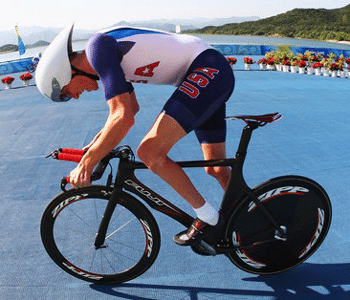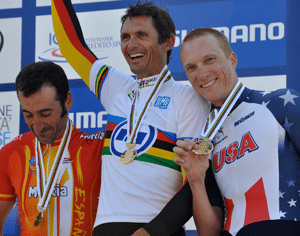
Anthony Zahn
Anthony Zahn played soccer in kindergarten, but he wasn’t great at it. As a freshman in high school, he tried to play football, but his knees hurt so badly he had to quit. At 15, undeterred by his knee pain, Anthony took up cycling with the dream of riding in the Tour de France. It took a year and a half for a neurologist in Loma Linda, California, to realize the cause of his knee pain was CMT. Anthony brushed off the diagnosis and held onto his dream, deciding that he would be even more famous as the first man to ride in the Tour de France with a degenerative neuromuscular disease.
Anthony won the first race he ever entered, a relay triathlon in which he rode the bicycling portion of the race. He attributes that victory mostly to the two other people on his team. As time went on, Anthony began competing in bicycle road races, often finishing in the middle of the pack. Then one day, a fellow bicycle racer who had muscular dystrophy noticed Anthony’s skinny legs and they began talking. The disabled racer, a man named Ryan Levinson, recommended that Anthony get the level of his disability classified, and then race as a para-athlete. Anthony agreed, shifted his goals and kept reaching upward.

Anthony Zahn (right) on the podium in Beijing
The severity of Anthony’s disability was officially classified (a requirement for a para-athlete) in July 2005, and he began competing as a disabled athlete. It took him two years to rise through the ranks to the very highest level of competition, the USA National “A” Team. In 2008, he won a coveted spot on the US Paralympic team headed to Beijing. The Paralympics are held immediately after the able-bodied Olympics, in the same venues. Anthony describes them as a big, crazy circus. The athletes, according to Anthony, have a stunning array of body types, from tiny female gymnasts to enormous male bodybuilders. Throw in disabilities of every conceivable nature, and the people watching rises to a whole new level. With the nightclubs and other distractions in the Olympic village, the trick, according to Anthony, is to soak it all in while still staying focused on your races. Anthony must have achieved the right balance because he medaled in Beijing, bringing home the bronze medal in the individual time trial.
Four years later, at a World Cup race in a small town in northeast Canada, a car somehow entered the course and collided with Anthony. The collision resulted in a concussion, two cracked ribs, a separated shoulder and various other scrapes and bruises. Despite his injuries, Anthony traveled to London just six weeks later and was able to put together two eighth-place finishes in the 2012 Paralympics.
Anthony is no stranger to surgery. At 22, he had a procedure known as a “triple arthrodesis” (the fusion of three main joints) on his left foot, along with a tendon transfer. Post-surgery, Anthony was in a full leg cast for six months and a partial cast for another six months. It was more than a year before he could put a shoe on his left foot and 18 months before he could climb back on a bicycle. He has also undergone a carpal tunnel release and toe-straightening procedures.
Despite the injuries and surgery, Anthony does not take any pain medication, not even ibuprofen. No fan of drugs in the first place, his concern for being suspended from racing because of a drug test made the decision even easier. Anthony does not use any special equipment, either on his bicycle or his person. The bicycles he rides are expensive but not equipped in any special way for his disability. He once had a pair of custom cycling shoes with built-in AFOs, but the constant stress quickly broke them and now he wears standard clip-ins.
On July 6, 2014, at the Road Cycling National Championships in Madison, Wisconsin, Anthony retired from bicycle racing. After a 25-year career, retiring was bittersweet. He loved the racing and his fellow racers and had medaled at every level of competition, including three bronze medals at the world championships. But he no longer had the energy for the training required to compete at a world-class level. Anthony believes that while recreational exercise can be beneficial for people with CMT, the intense training he did probably exacerbated his condition.
Today, Anthony coaches other cyclists at all levels, from weekend athletes to Paralympic hopefuls. If you are interested in benefiting from Anthony’s years of cycling experience, you can contact him on Facebook at www.Facebook.com/AtoZcycling.
Anthony Zahn has been a member of the CMTA since 2012.





